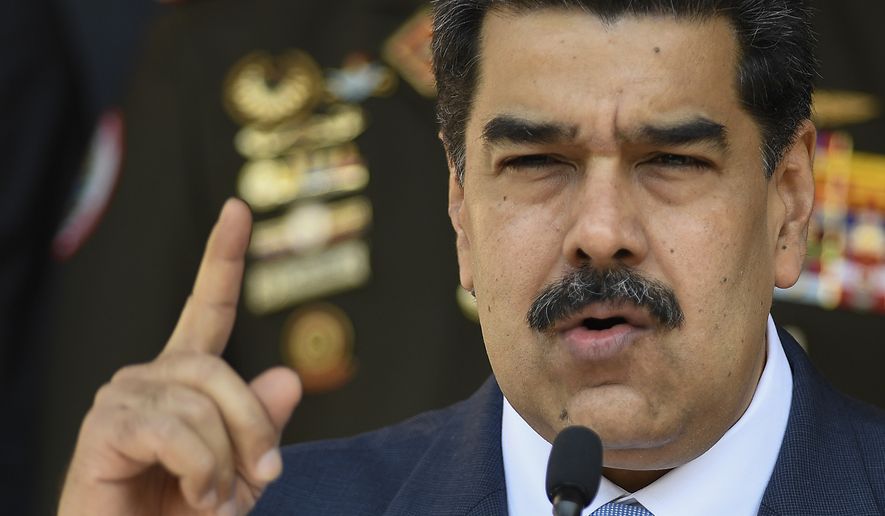The U.S. government Thursday unveiled a slew of criminal charges against Venezuela’s socialist president and additional sanctions on Iran, signs the Trump White House is not easing up on hostile powers in the face of growing calls that such punitive moves be suspended as the world battles the coronavirus pandemic.
The legal charges target Venezuelan leader Nicolas Maduro and 14 other current and former officials — including Venezuelan’s Supreme Court chief justice, minister of defense, head of the national constituent assembly, a former director of military intelligence and a former general — accusing them of money laundering and drug trafficking.
It’s the first time Washington has directly charged a head of state since Panama’s Manuel Noriega in 1988, and is likely to torpedo any hope of a negotiated deal for Mr. Maduro to step down voluntarily.
While Mr. Maduro, who has stubbornly resisted a U.S.-backed pressure campaign to drive him from office, rejected the charges on Twitter, Attorney General William Barr told reporters the defendants trafficked more than 250 million metric tons of cocaine — the equivalent of 30 million lethal doses — into the United States.
While the moves against Caracas and Tehran were generally welcomed on Capitol Hill, countries that are the frequent targets of U.S. sanctions — including China, Russia, Iran, Venezuela and North Korea — are mounting an aggressive PR campaign against Washington’s policies, claiming they should receive economic relief as the world struggles to contain the spread of coronavirus.
Their complaints have drawn the backing of some top officials at the United Nations.
The U.N. leading human rights official, Michelle Bachelet, and World Health Organization Director-General Tedros Adhanom Ghebreyesus wrote a letter, backed by some of the countries most targeted by the Trump administration, calling on Secretary-General Antonio Guterres to lift “coercive and arbitrary measures of economic pressure” and to “reject the politicization of such a pandemic.”
Mr. Guterres just days earlier encouraged the Group of 20 economic powers to waive “sanctions imposed on countries to ensure access to food, essential health supplies, and COVID-19 medical support.”
“This is the time for solidarity not exclusion,” he said.
But the State Department later on Thursday unveiled yet another round of sanctions on 20 Iran and Iraq-based companies, officials, and business associates that the U.S. claims have supported Iraqi Shiite militia groups attacking American and coalition forces in Iraq.
U.S. officials say the new sanctions do not restrict the flow of vital humanitarian aid, food and medical supplies into Iran, which has been one of the hardest hit countries by the coronavirus. At least 2,234 Iranians have died, and dissident exile groups say real toll could be four times higher.
Iranian U.N. envoy Majid Takht Ravanchi on Twitter this week accused Washington of “economic terrorism.”
U.S. sanctions, he tweeted, “literally kill innocents. … It is immoral to observe them [and] doing so has never saved anyone from future U.S. wrath.”
Federal prosecutors said Venezuela’s Mr. Maduro, a longtime protege of the late populist Venezuelan President Hugo Chavez, personally negotiated cocaine shipments and coordinated relations with other countries to use their trade routes for shipment. Senior members of Venezuela’s government have already been accused by both the Obama and Trump administrations of involvement in drug trafficking.
One indictment unsealed Thursday charged that Mr. Maduro oversaw a military-backed drug trafficking operation called Cartel de Los Soles — “Cartel of the Suns” — that “flooded” the U.S. market with cocaine.
“While the Venezuelan people suffer, this cabal lines its pockets with drug money and the proceeds of their corruption,” Mr. Barr said.
Also Thursday, the U.S. State Department announced a $15 million reward for information leading to Mr. Maduro’s capture and a $10 million reward for the other Venezuelan officials.
Senate Foreign Relations Committee Chairman Sen. James Risch, Idaho Republican, said the moves “mark another opportunity for the countries of the Americas and Europe to take stronger action to support the return of democracy and the rule of law in Venezuela, and to help stop the slide to authoritarianism in the region.”
Leading Venezuelan-Americans who oppose Mr. Maduro and are a key voting bloc in the critical state of Florida, also welcomed the charges.
“It cost us a lot to get to this point, but we don’t have a doubt: from today onwards, the game has changed,” Lester Toledo, an exiled former opposition leader who supports Juan Gauido, the U.S.-backed parliamentary speaker in Caracas who claims to be the rightful president.
• Jeff Mordock can be reached at jmordock@washingtontimes.com.
• Lauren Toms can be reached at lmeier@washingtontimes.com.




Please read our comment policy before commenting.